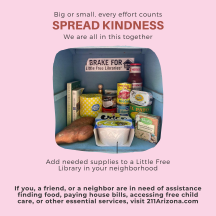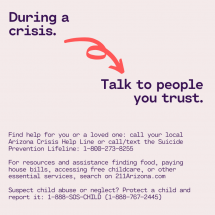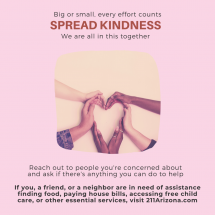Check In with Families in Your Community to See How You Can Help
It is important to remind caregivers and children that you are there to help, not judge them. If a child raises a concern, consider if you can safely follow-up with their caregiver. Affirm that this is a difficult time, everyone is struggling, and that support is still available. Click here for a list of resources you can connect families with based on their needs.
Questions You Might Ask Parents/Caregivers:
- Is now a good time to talk? If not, is there a better time?
- Now is a hard and stressful time for everyone. How are you? Are you okay and safe? What do you need?
- We all need support right now. Who are the supports in your life? Are you able to connect with them right now? How are you relieving stress during this time?
- Since the COVID-19 emergency started, what’s changed for your family? Has anything been more of a struggle? Are you facing new worries or needs? Has anything improved or gotten better?
- Is everyone in your family able to get what they need to get by (for example, you can ask the family about food, housing, income/employment, safety, education, health, air conditioning, internet, etc.)?
- Do you need help connecting to _________? Click here for resource suggestions based on family's needs. Para español, haga clic aquí.
Questions You Might Ask Children:
- How is virtual learning working for you? How is it affecting you? Your family? Do you need help with anything?
- How are things going at home for you and your family? Are you feeling okay? Are you worried about anything?
- What do you like most about staying at home? What do you like least? Why?
- What was the best part of your day? What was the hardest part of your day?
- Who is taking care of you? What are they doing to help you? Who makes sure you have what you need?
- Who do you feel safe talking to about needs or worries? Do you have a way to talk to that person right now?
- If you were stranded on a desert island, what would you need? Are those things in your house right now?
- What did you have to eat for breakfast today? Yesterday?
- What are the rules in your house? What happens when someone breaks a rule? (Sibling, pet, mom, dad?)
- How is everyone getting along? Is anyone having a hard time? Are you worried about anyone? Why?
- Ask the child to describe a typical day – what they eat, who makes the food, where do they play, who comes to or leaves the house and when, do they have electricity, etc.?
- To follow up, ask open-ended questions: Tell me more about that. . . What happened next? What is happening right now?
To learn more about how to talk to children about COVID-19, download this SAMHSA Fact Sheet.
Look out for the Safety of Children and Families
- If you have any concerns that a child or caregiver is in immediate danger, call 911.
- If you suspect that a child is being abused or neglected, you must call AZ’s Child Abuse Hotline: 1-888-767-2445.
- Complete the Mandatory Reporting of Child Abuse & Neglect Free Online Training from Prevent Child Abuse Arizona (PCAA).
Examples of when you might follow-up for more information or call DCS (Dept. of Child Safety) with a concern:
- Anything the caregiver or child told you raised concerns for the child’s safety.
- The child OR caregiver has concerning injuries or unexplained bruises, welts, or cuts.
- The caregiver appears to be under the influence to the extent they could not care for their child.
- You observe evidence of illicit substance use in the home (e.g., drug paraphernalia) or other hazards that could lead to child injury/illness (e.g., weapons in reach, extremely unsanitary conditions).
- The child looks or behaves significantly differently than is typical for them or would be reasonably expected.
- You are repeatedly unable to get in touch with the family (unrelated to barriers like internet, phone access) AND are seriously worried for their safety (e.g. prior safety concerns due to domestic violence or substance
Social Media
Spread the word about how we can all help support children and families!
- Distribute the Resource Guide in your e-newsletter, individual client work, and/or linked on your website.
- Display these ready-to-post flyers on your social media platforms, as well as lobbies, restrooms, and other visible locations if you’re open for business/clients/patients to ensure families are receiving the help they need.



